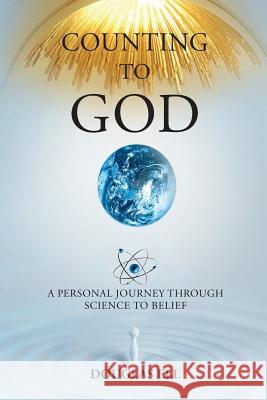Counting To God: A Personal Journey Through Science to Belief » książka
Counting To God: A Personal Journey Through Science to Belief
ISBN-13: 9780963270184 / Angielski / Miękka / 2014 / 288 str.
What if you could harmonize science and faith? What if science itself pointed to a reality outside of space and time, and a Designer behind all that exists? In Counting To God, Douglas Ell applies the lens of mathematical analysis to recent scientific discoveries, drawing startling conclusions. He explains seven areas where modern science supports the existence of God Scientific breakthroughs over the past half century contradict the popular paradigm that science and traditional religion do not mix. The ensuing, often heated, debates can be hard for outsiders to follow, because of both the volume of data involved and esoteric truth claims on each side. Shining a new light on these debates, and perhaps providing the key to the truth, Ell uses scrupulous analysis and probability calculations to make a convincing case that the most advanced, sophisticated thinking in science not only allows for the idea of a designed universe, but encourages it. As the adage says, numbers don't lie. Although Counting To God is substantially a work of science, Ell writes in plain English - a "science for non-scientists" style - and gives examples in the form of thought exercises to illustrate concepts such as the true scale of very large numbers (critical to understanding what exactly can occur through random events over time). How careful is the science? Counting To God has been endorsed by a number of leading scientists, including the head of the physics department at MIT. A former non-believer, Ell traces his 30-year journey - following the evidence of science - from atheism to belief. Thus, while his book is about the existence of God, Ell's arguments address the world view of unbelievers and agnostics. I highly recommend this thoughtful exploration of the relation between science and spirituality, two seemingly opposed descriptions of our world. Posed as a personal journey, Doug asks "How can we relate the descriptions of the spiritual and physical worlds?" Doug takes on the biggest questions of our time: cosmology, the origin of the universe and the biochemistry of genetics in a relevant and accessible way. Whether you agree with him or not, you will enjoy and learn from this book. -Professor Peter Fisher, Head of the Department of Physics, MIT
What if you could harmonize science and faith? What if science itself pointed to a reality outside of space and time, and a Designer behind all that exists? In Counting To God, Douglas Ell applies the lens of mathematical analysis to recent scientific discoveries, drawing startling conclusions. He explains seven areas where modern science supports the existence of GodScientific breakthroughs over the past half century contradict the popular paradigm that science and traditional religion do not mix. The ensuing, often heated, debates can be hard for outsiders to follow, because of both the volume of data involved and esoteric truth claims on each side. Shining a new light on these debates, and perhaps providing the key to the truth, Ell uses scrupulous analysis and probability calculations to make a convincing case that the most advanced, sophisticated thinking in science not only allows for the idea of a designed universe, but encourages it. As the adage says, numbers dont lie. Although Counting To God is substantially a work of science, Ell writes in plain English - a "science for non-scientists" style - and gives examples in the form of thought exercises to illustrate concepts such as the true scale of very large numbers (critical to understanding what exactly can occur through random events over time). How careful is the science? Counting To God has been endorsed by a number of leading scientists, including the head of the physics department at MIT. A former non-believer, Ell traces his 30-year journey - following the evidence of science - from atheism to belief. Thus, while his book is about the existence of God, Ells arguments address the world view of unbelievers and agnostics. I highly recommend this thoughtful exploration of the relation between science and spirituality, two seemingly opposed descriptions of our world. Posed as a personal journey, Doug asks "How can we relate the descriptions of the spiritual and physical worlds?" Doug takes on the biggest questions of our time: cosmology, the origin of the universe and the biochemistry of genetics in a relevant and accessible way. Whether you agree with him or not, you will enjoy and learn from this book. -Professor Peter Fisher, Head of the Department of Physics, MIT











